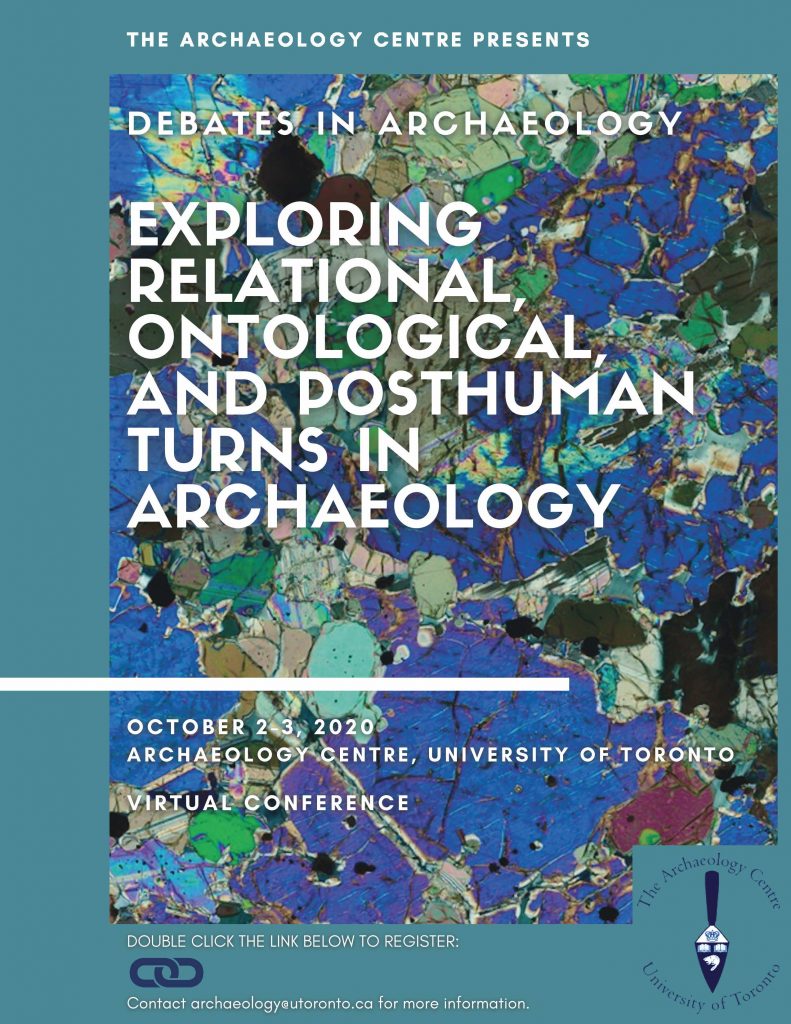Debates in Archaeology returned in fall 2021 with a highly successful online symposium.

2020 Symposium: Exploring Relational, Ontological, and Posthuman Turns in Archaeology
DATES: October 2-3, 2020
LOCATION: Online (Zoom)
WATCH THE WHOLE CONFERENCE HERE:
ABSTRACT:
On the rise in contemporary archaeological theory is a radical new set of questions and debates concerning relationality, ontology, and osthumanism. Relational approaches look to the deep interconnections between people, things, and landscapes. Ontological approaches ask about the mind-independent nature of the world, the arbitrariness of the western gaze, and the possibility for radical difference. Finally, posthumanism questions human exceptionalism while asking archaeologists to move beyond the notion of the “default human” as a white western male.
The origins of these new approaches are multiple. Some derive from theoretical debate and critique within the discipline, while others emerged from a general dissatisfaction with the colonial roots and tendencies of archaeology (Deloria 1969, 1995). Bjørnar Olsen’s (2003) critique of post-processual archaeology and his call to “re-member” things provides an early example of the former. Thus, a host of new questions has arisen about relations, things, and the status of the human in our work. Emerging from the latter tension were calls to diversify, decolonize, and Indigenize the discipline, leading to increased attention on Indigenous expertise,
knowledge, sensitivities, and interests while scrutinizing the discipline’s Enlightenment-inherited defaults. These theoretical developments raised new concerns over relationality, more-than-human approaches to the past, and, crucially, western appropriation of Indigenous concepts (Todd 2016).
In the end, the symposium focuses on the relationship between these new but different directions, a complex and often unexplored dimension of archaeological theory (cf. Tallbear 2014). Speakers will take into account multiple perspectives on relationality, ontology, and posthumanism from within archaeology and anthropology in order to better situate these lines of theory in contemporary thought and practice.
References Cited
Deloria, Jr., Vine
1969 Custer Died for Your Sins: An Indian Manifesto. Noman: University of Oklahoma Press.
Deloria, Jr., Vine
1997 Red Earth, White Lies: Native Americans and The Myth of Scientific Fact. Golden, CO: Fulcrum.
Olsen, Bjørnar
2003 Material Culture After Text: Re-membering Things. Norwegian Archaeological Review 36(2):87-104.
Tallbear, Kim
2014 Standing With and Speaking as Faith: A Feminist-Indigenous Approach to Inquiry. Journal of Research Practice 10(2): 1-8.
Todd, Zoe
2016 An Indigenous Feminist’s Take on The Ontological Turn: ‘Ontology” is Just Another Word for Colonialism. Journal of Historical Sociology 29(1):4-22.